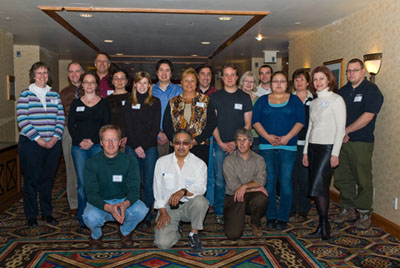December 2009
ELOKA and the Sustained Arctic Observing Networks (SAON) have begun collaborating on an inventory of Local and Traditional Knowledge (LTK) projects in the Arctic. This inventory will be used in the development of a map-based, searchable directory of Arctic LTK-related projects.
August 2009
The National Science Foundation (NSF) awarded funds to NSIDC for the continued development of ELOKA. This new award will move ELOKA into a fully operational mode that will help data providers and communities acquire, manage, and preserve their data, and to provide user-friendly tools for searching, browsing, and accessing data through the ELOKA website or the data providers' sites as a means of access to all partner projects. The funding is part of a contribution to the NSF Arctic Observing Network.
June 2009
The ELOKA project team is working to complete the first two examples of data management for two ELOKA collaborators. These are expected for release later this year.
November 2008

Over 20 people representing northern communities, organizations, and research projects met in Anchorage, Alaska, on November 11 and 12 for the second ELOKA project workshop. The group discussed shared challenges and goals for data management of Local and Traditional Knowledge (LTK), and worked together to create future priorities for ELOKA.
September 2008
ELOKA launched a new website to eventually develop ELOKA tools and services, such as a searchable database that assists users in finding information about LTK and community-based monitoring projects throughout the Arctic.
July 2008
Isuma TV is a new internet video portal for Indigenous filmmakers that features unique, Indigenous-language content 24 hours a day, 7 days a week.
April 2008
The "Silavut: Inuit Voices in a Changing World" exhibit opened April 15, 2008 at the University of Colorado Museum of Natural History in Boulder, Colorado. The exhibit relates the story of climate change through Inuit eyes in collaboration with the National Snow and Ice Data Center (NSIDC), the museum, and the community of Clyde River in Nunavut, Canada. The show ended March 15, 2009.
January 2008
Sanikiluaq, Nunavut Canada—ELOKA project manager Chris McNeave traveled to Sanikiluaq to advice members of a planning committee, which developed a strategy for a proposed regional environmental study that combines scientific observations with LTK from surrounding Inuit and Cree communities.
Abisko, Sweden—ELOKA co-principal investigator Henry Huntington met with project collaborators to discuss ELOKA and partner status, and collaborate with the Abisko Scientific Research Station and the Saami community.
December 2007
ELOKA began working with Dr. Martin Nweeia of Harvard University and the Smithsonian Institution. Dr. Nweeia is working with narwhal hunters from Greenland and Baffin Island studying narwhal migration and their salinity-sensitive tusks.
ELOKA principal investigator Shari Fox presented a poster on ELOKA at the Annual Scientific Meeting of ArcticNet in Collingwood, Ontario.
November 2007
Sanikiluaq, Nunavut Canada—ELOKA project manager Chris McNeave met with community members and representatives from the Hudson Bay Bioregion Community-based Monitoring Network and System (HUBB) to develop ELOKA and community relationships, and to identify ELOKA-related tasks.
October 2007
Anchorage, Alaska—ELOKA co-principal investigator Henry Huntington and project manager Chris McNeave met with partners and collaborators from Alaska Native Science Commission (ANSC), Alaska Biological Research (ABR), and Bering Sea Sub-Network (BSSN) to review the projects and discuss partner status and needs from ELOKA.
March 2007
ELOKA approved for funding by the NSF International Polar Year program (IPY).
May 2006
First ELOKA proposal submitted to the National Science Foundation Program Solicitation: NSF 06-534, International Polar Year.
November 2005
ICSU/WMO Joint Committee for the International Polar Year 2007-2008 endorses the full ELOKA proposal on the IPY website.

